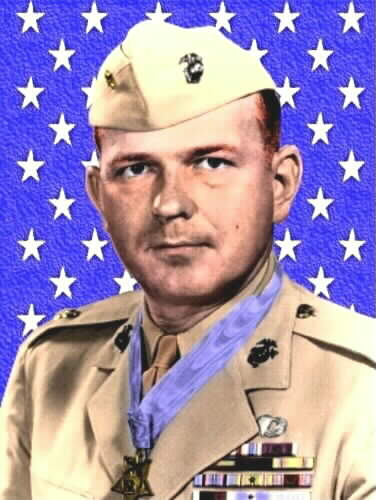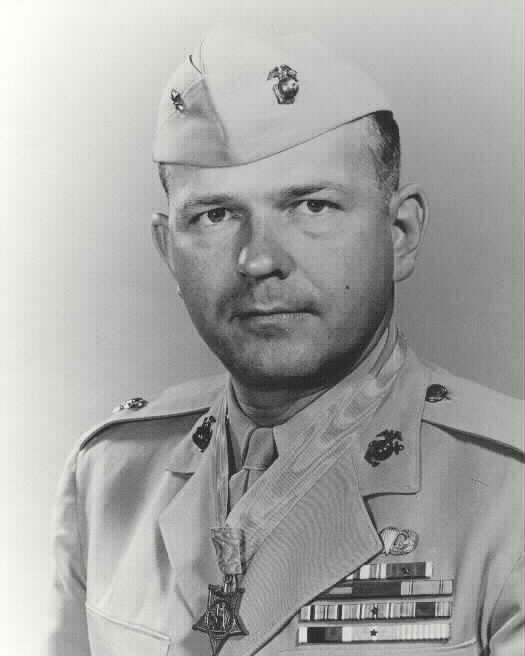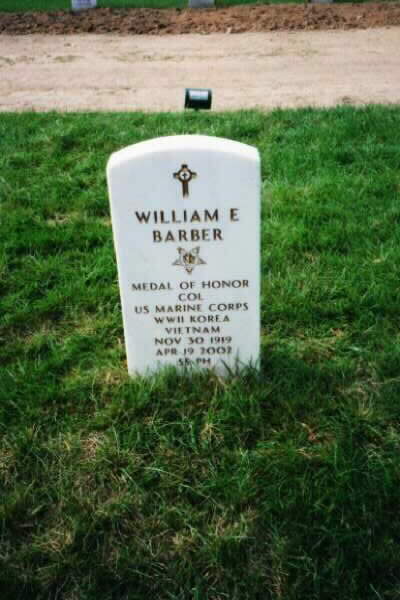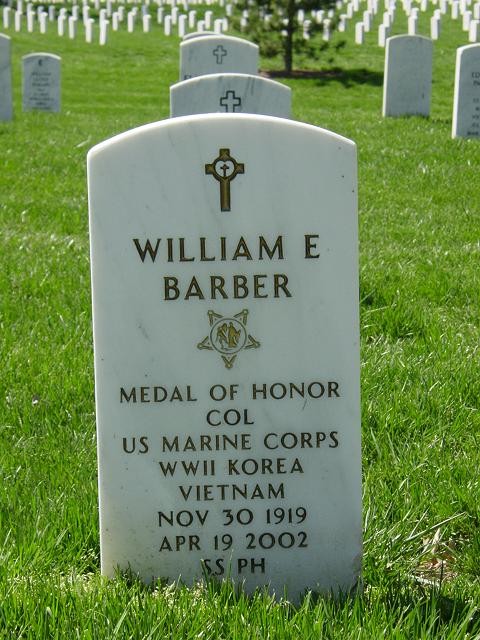BARBER, WILLIAM E.
Rank and organization: Captain U.S. Marine Corps, commanding officer, Company F, 2d Battalion 7th Marines, 1st Marine Division (Rein.).
Place and date: Chosin Reservoir area, Korea, 28 November to 2 December 1950.
Entered service at: West Liberty, Kentucky. Born: 30 November 1919, Dehart, Kentucky.
Citation:
For conspicuous gallantry and intrepidity at the risk of his life above and beyond the call of duty as commanding officer of Company F in action against enemy aggressor forces.
Assigned to defend a 3-mile mountain pass along the division’s main supply line and commanding the only route of approach in the march from Yudam-ni to Hagaru-ri, Captain Barber took position with his battle-weary troops and, before nightfall, had dug in and set up a defense along the frozen, snow-covered hillside.
When a force of estimated regimental strength savagely attacked during the night, inflicting heavy casualties and finally surrounding his position following a bitterly fought 7-hour conflict, Captaun Barber, after repulsing the enemy gave assurance that he could hold if supplied by airdrops and requested permission to stand fast when orders were received by radio to fight his way back to a relieving force after 2 reinforcing units had been driven back under fierce resistance in their attempts to reach the isolated troops.
Aware that leaving the position would sever contact with the 8,000 marines trapped at Yudam-ni and jeopardize their chances of joining the 3,000 more awaiting their arrival in Hagaru-ri for the continued drive to the sea, he chose to risk loss of his command rather than sacrifice more men if the enemy seized control and forced a renewed battle to regain the position, or abandon his many wounded who were unable to walk.
Although severely wounded in the leg in the early morning of the 29th, Captain Barber continued to maintain personal control, often moving up and down the lines on a stretcher to direct the defense and consistently encouraging and inspiring his men to supreme efforts despite the staggering opposition. Waging desperate battle throughout 5 days and 6 nights of repeated onslaughts launched by the fanatical aggressors, he and his heroic command accounted for approximately 1,000 enemy dead in this epic stand in bitter subzero weather, and when the company was relieved only 82 of his original 220 men were able to walk away from the position so valiantly defended against insuperable odds.
His profound faith and courage, great personal valor, and unwavering fortitude were decisive factors in the successful withdrawal of the division from the deathtrap in the Chosin Reservoir sector and reflect the highest credit upon Captain Barber, his intrepid officers and men, and the U.S. Naval Service.
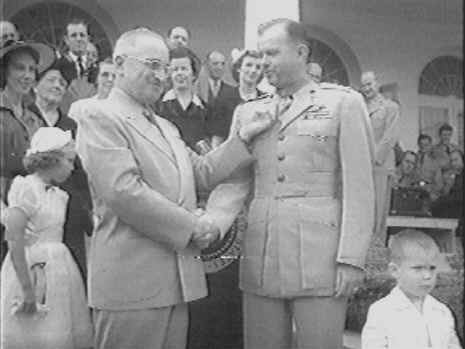
April 22, 2002
Korean War hero; 82
Irvine, California — Korean War hero and career military man Col. William E. Barber, a Medal of Honor recipient, has died after a long battle with bone marrow cancer. He was 82.
Colonel Barber died Friday of liver failure in his home surrounded by his family, said family friend Jerry A. Courtier. He died not far from the Colonel Bill Barber Marine Corps Memorial Park.
Colonel Barber is best-known for his heroism in one of the worst defeats in Marine history, the Battle of the Chosin Reservoir in 1950. Colonel Barber’s Fox Company was outnumbered by a more than 5-1 ratio at the reservoir south of the Yalu River, which separates North Korea from China.
U.S. troops had pushed North Koreans all the way to the uppermost area near China. Few thought the Chinese would join the battle, but in the weeks before Thanksgiving, roughly 120,000 Chinese crossed the Yalu River into North Korea.
On November 27, the Chinese attack gained a U.S. machine gun position. Colonel Barber was hit by a bullet that fractured a bone near his groin. He said he felt blood but didn’t stop fighting.
Commanding his men from a stretcher, Colonel Barber, then a Captain, refused to obey orders to leave a hill. He believed retreating would trap about 8,000 nearby Marines.
He told his commander he needed supply drops. Temperatures hovered at 20 degrees below zero and coffee froze before the men could drink it.
After five days and six nights of battle, more than 1,000 enemy troops were dead. The Marines made three rescue attempts. Finally, Ray Davis, who later became a General, overwhelmed the Chinese with his Marines and came face-to-face with Colonel Barber. The two men were so choked up that neither could speak, Davis later recalled.
Despite earning the Medal of Honor – partially for his decision to disobey the retreat order – Colonel Barber was a modest man.
“He would answer a direct question, but he didn’t talk about it very much and he didn’t belabor it,” said Orange County Supervisor Jim Silva.
Colonel Barber, born on Nov. 30, 1919, in West Liberty, Kentucky, attended Morehead State College in Kentucky and enlisted with the Marines in 1940.
In 1943 during World War II, Colonel Barber was commissioned as a Second
Lieutenant. In July 1944, he fought at Iwo Jima, where he was wounded twice. His many awards include two Purple Hearts, the Silver Star for bravery, three Presidential Unit Citations and the Legion of Merit.
Colonl Barber was a psychological operations officer in Vietnam. He later told a reporter he thought some of the greatest acts of heroism in war were performed by POWs who had been tortured in Vietnam. After retiring in 1970, Colonel Barber became a military analyst for Northrop Corp. in Anaheim, California.
Colonel Barber is survived by his wife of 60 years, a son and daughter. Colonel Barber will be buried later at Arlington National Cemetery.
Colonel William Earl Barber, who was awarded the Medal of Honor during a military career that spanned four decades and three wars in Asia, died in his Irvine home Friday of complications from liver failure and bone marrow cancer, a family spokesman said.
Barber, 82, was awarded the nation’s highest military honor after leading his troops to defend a key pass near the Chosin Reservoir during one of the epic battles of the Korean War, despite being wounded in the leg by machine-gun fire.
Barber’s company held a strip of mountain terrain near the reservoir, close to China’s border, allowing about 8,000 of his fellow soldiers to escape an ambush by the Chinese army. The battle ranks in Marine history with World War II’s fights over the Pacific islands of Iwo Jima and Guadalcanal and, friends said, is taught in military schools as an example of brilliant defense strategy.
Known to friends as “The Colonel,” Barber first saw combat in Japan in World War II near the beginning of a career that lasted 30 years. But it was his service in the Korean War that brought him the most attention.
Though well-decorated–his medals include two Purple Hearts and the Silver Star — Barber was reticent to discuss his achievements, preferring to dwell on the exploits of others.
“He had a lot of sensitivity, intelligence and humility, but was a warrior at heart,” said Jerry Courtier, the family spokesman and a friend of Barber who plans to write his biography. “You could describe him as a reluctant hero.”
Born November 30, 1919, on a Kentucky farm, Barber joined the Marine Corps at 20. He spent the first part of World War II as a weapons instructor at mainland bases, including Camp Pendleton, then went to the Pacific Theater in 1944 as a First Lieutenant leading a platoon in Company E, 2nd Battalion, 26th Marine Regiment.
When his commander was wounded, Barber took charge of the company and led it for the last three weeks of the campaign. He was wounded as he crawled through enemy fire to rescue two fallen comrades, Courtier said.
Barber’s actions earned him the Silver Star for bravery and the Purple Heart for his wounds.
Barber was promoted to Captain before being assigned to the 1st Marine Division in Korea in October 1950. He took command of Company F, 2nd Battalion, 7th Marine Regiment.
In November 1950, Barber and 220 soldiers in Fox Company were among a contingent of Marines near the Chosin Reservoir when it was ambushed by the Chinese army, which was joining the war on the side of the North Koreans.
For thousands of U.S. troops, the only escape was through a narrow pass that Barber’s company was ordered to defend at all cost.
Outnumbered at least 10 to 1, Barber’s troops withstood repeated assaults over five days in freezing weather. At one point, Barber received orders to pull back but asked permission to remain and try to hold out.
“I knew that we could probably hold, and I knew that if we didn’t hold, we could exact a very heavy toll,” he recalled in a 1976 interview. At the end of the battle, only 82 of Barber’s soldiers could walk away.
Barber remained in the Marines and was awarded the Legion of Merit for seervice in Vietnam before retiring as a full colonel in 1970.
Barber is survived by his wife, Ione; a son, John; a daughter, Sharon; and three granddaughters.
William E. Barber, 82, a retired Marine Corps colonel who won the Medal of Honor for valiant behavior after being shot in the leg during the Chosin Reservoir campaign of the Korean War — going so far as to conduct his troops by stretcher — died April 19, 2002, at his home in Irvine, Calif. He had liver failure and bone marrow cancer.
Col. Barber’s actions in battle, including his refusal to abandon a key supply route despite horrific odds, enabled 8,000 U.S. soldiers to escape an ambush by Chinese forces allied with the North Koreans.
At a news conference in 1952 for receiving the nation’s highest military award for valor, Col. Barber was the consummate quiet hero. “One bullet doesn’t stop a man,” he told the crush of reporters. He likened the bullet wound to a bee sting.
By then, he had already passed his own standard of what it takes to fell a man. He had been shot during World War II while rescuing two wounded Marines from enemy territory during the battle for Iwo Jima. That action earned him the Silver Star and the Purple Heart.
Colonel Barber — then a Captain — won the Medal of Honor for his duty as commanding officer of a rifle company assigned to the Chosin Reservoir area near Korea’s border with China.
He held his ground from November 28 to December 2, 1950, mere weeks after more than 100,000 Chinese had crossed the Yalu River into North Korea and were waiting to surprise U.S. and South Korean soldiers who had fought their way north to the border.
That bitter, brutal winter near the “Frozen Chosin,” he was charged with defending a three-mile mountain pass along his division’s main supply line. On the first night, during a seven-hour battle that began with the enemy’s bugle call, his company suffered enormous losses but drove away the Chinese.
On the second night, about 50 Chinese broke through, and Col. Barber was shot in the right leg. Ordered to relocate, he told his superiors he could hold out if U.S. forces would airdrop more supplies.
By stretcher, he directed and inspired his company of 220 men to fight off the advancing Chinese — thousands of them.
The fighting lasted six nights, and by the end, 1,000 Chinese lay dead. Only 82 of Colonel Barber’s men could walk away when they were relieved from their position. Many were dead; many were too frostbitten to stand. His Medal of Honor citation read: “His profound faith and courage, great personal valor, and unwavering fortitude were decisive factors in the successful withdrawal of the division from the deathtrap in the Chosin Reservoir sector and reflect the highest credit upon Capt. Barber, his intrepid officers and men, and the U.S. Naval Service.”
There have been about 3,400 winners of the Medal of Honor since it was created in 1861.
William Earl Barber was born on a farm near Dehart, Kentucky. He was attending what is now Morehead State University in Kentucky when he enlisted in the Marine Corps in 1940.
During World War II, he was a platoon leader in the Pacific theater when he was called on to replace his wounded commander. During that time, he rescued his fellow Marines.
Colonel Barber went on to serve as a psychological operations officer during the Vietnam War and saw combat there. He received the Legion of Merit for that work and retired in 1970.
During his military career, he completed his undergraduate education at Morehead.
Reflecting on his Korean War exploits, he told a reporter that despite the enemy forces’ overwhelming numbers, they were predictable.
“They attacked the same position five nights in a row, at the same time and using the identical route,” he told the Los Angeles Times. “Luck in combat is very fickle. I’ve noticed through the years that those who make the best preparations have the best luck. . . . But we were also very good, and that wasn’t luck.”
Survivors include his wife, Ione Barber, and two children.
Courtesy of the United States Marine Corps:
Colonel William E. Barber, who earned the Medal of Honor during the bitter Chosin Reservoir campaign in Korea in November and December, 1950, retired from active duty May 1, 1970. A captain at the time he won the Medal, he led his company in a desperate five-day defense of a frozen mountain pass vital to the 1st Marine Division’s breakout to the sea.
Fighting in sub-zero temperatures against overwhelming odds, he was wounded on the first night of the action, but refused evacuation and remained in action in command of his company. He was presented the Medal of Honor by President Truman in ceremonies at the White House on August 20, 1952.
A World War II veteran and former paramarine, Colonel Barber earned the Silver Star Medal and his first Purple Heart as a second lieutenant at Iwo Jima, where he disregarded his own wounds and direct enemy fire to rescue two wounded Marines from enemy territory.
William Earl Barber was born November 30, 1919, at Dehart, Kentucky. He completed Morgan County High School at West Liberty, Kentucky, and attended Morehead (Kentucky) State Teachers College prior to enlisting in the Marine Corps in March 1940.
Upon completing boot camp at Parris Island, South Carolina, and parachute training at the Naval Air Station, Lakehurst, New Jersey, he was designated a paramarine and assigned as a parachute instructor at the newly activated Parachute Training School, New River, North Carolina. In May 1943, he entered Officer Candidates School at Marine Corps Schools, Quantico, Virginia, and was commissioned a second lieutenant August 11 of that year.
Lieutenant Barber served with the 1st Parachute Regiment on the West Coast until 1944. Assigned as a platoon commander with the 26th Marine Regiment, 5th Marine Division, at Camp Pendleton, California, he embarked for the Pacific area and later took part in combat on Iwo Jima. After being wounded, he was evacuated and later returned to his unit, serving as company commander during the last two weeks of the operation. Shortly after, he was promoted to first lieutenant and again commanded the company during the initial occupation of Japan.
Returning to the United States in 1946, he performed recruiting duty in Milwaukee, Wisconsin, served as a rifle company commander with the 8th Marines, 2d Marine Division, at Camp Lejeune, North Carolina; Inspector-Instructor of the Marine Corps Reserve’s Company D, Sixth Infantry Battalion, at Altoona and Philadelphia, respectively.
In October 1950, as a captain, he was ordered to Korea and took part in the action which earned him the Medal of Honor. Wounded on November 29, he was evacuated on December 8, and hospitalized in Yokosuka, Japan, until his return to the United States in March 1951. The following month, he joined the San Diego Recruit Depot as a company commander and later Executive Officer of the 1st Recruit Training Battalion. He was promoted to major in July 1952.
Major Barber completed the Advanced Infantry Course, Fort Benning, Georgia, in March 1954, then served as Operations and Training Officer, 2d Battalion, 2d Marines, Camp Lejeune. From 1956 to 1958, he served in Thailand as Assistant Naval Attache and Assistant Naval Attache for Air at the American Embassy in Bangkok. During the next four years he was assigned to Marine Corps Schools, Ouantico, and served as Assistant Chief Instructor of the Junior School. While there, he was promoted to lieutenant colonel in April 1960.
Again ordered overseas, Lieutenant Colonel Barber joined the 3d Marine Division on Okinawa in July 1962 as Commanding Officer, Reconnaissance Battalion. Following his return to the United States, he served at Headquarters Marine Corps as Head, Combat Requirements Section, until January 1966 when he became Head, Marksmanship Branch, G-3 Division, and served in this capacity until July 1967. He was promoted to colonel, September 22, 1965.
Transferred to the 2d Marines, 2d Marine Division, Marine Corps Base, Camp Lejeune, North Carolina, Colonel Barber served consecutively as Division Plans Officer, Assistant Chief of Staff, G-2 (Intelligence), and Commanding Officer of the 2d Marines, until May 1969.
Following that assignment, he was ordered to the Far East where he served his last tour of active duty as Psychological Operations Officer, III Marine Amphibious Force, Military Assistance Command, Vietnam. For his service in this capacity, he was awarded the Legion of Merit with Combat “”V”. He retired from active duty, May 1, 1970.
Besides the Medal of Honor, Silver Star Medal, the Legion of Merit with Combat “V””, and two Purple Hearts, Colonel Barber holds two Presidential Unit Citations, the Marine Corps Good Conduct Medal (1940-1943) , the American Defense Service Medal, the American Campaign Medal, the Asiatic-Pacific Campaign Medal with one battle star, the World War II Victory Medal, the Navy Occupation Service Medal with Asia clasp, the National Defense Service Medal with one bronze star, the Korean Service Medal with three battle stars, the Vietnam Service Medal with one bronze star, the United Nations Service Medal, the Korean Presidential Unit Citation, and the Republic of Vietnam Campaign Medal.
I am contacting you in the hope that you will correct a paragraph in the AP Wire report of Colonel Bill Barber’s death which you reprinted. We Marines serving at Chosin Reservoir in 1950 are quite upset over the AP paragraph which states:
“Colonel Barber is best-known for his heroism in one of the worst defeats in Marine History, the Battle of the Chosin Reservoir in 1950. Colonel Barber’s Fox Company was outnumbered by a more than 5-1 ratio at the reservoir south of the Yalu River, which separates North Korea from China.” (Emphasis added)
History confirms that when one very understrength Marine Division, a company of attached British Royal Marines and a regimental combat team of the Army’s 7th Division defeat 8 Chinese Divisions and elements of 2 others, there was no defeat for the Marines and soldiers. In fact it was the Chinese who were defeated. Marine, Royal Marine and U.S. Army forces suffered nearly 2,500 killed in action, and over 5,000 were wounded. The Chinese Communist forces suffered horribly, sustaining an estimated 43,500 casualties including over 28,000 killed with most of the enemy wounded freezing to death from the severe cold. Realizing you did not write the article your consideration will be appreciated.
Michael Robert Patterson was born in Arlington and is the son of a former officer of the US Army. So it was no wonder that sooner or later his interests drew him to American history and especially to American military history. Many of his articles can be found on renowned portals like the New York Times, Washingtonpost or Wikipedia.
Reviewed by: Michael Howard

